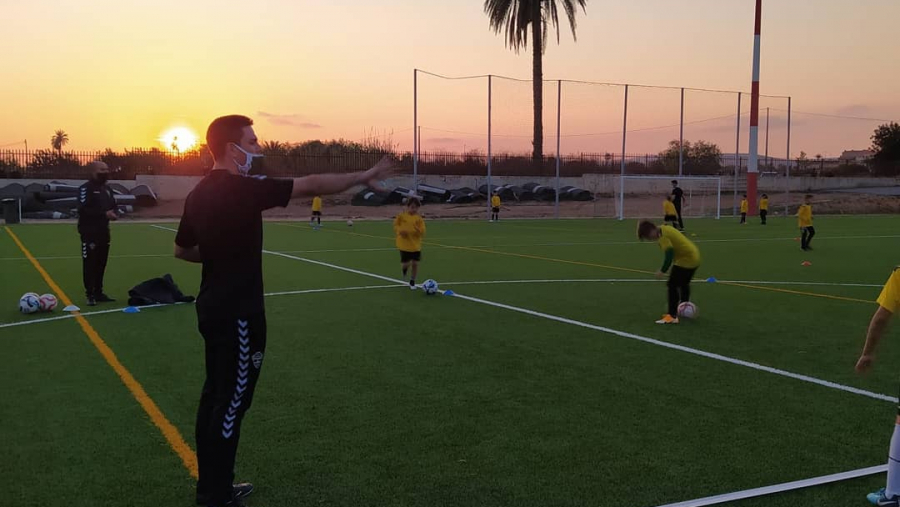
- The club’s ‘Goal and Check’ programme, designed by youth academy director Jorge Raffo, aims to teach players new ways of thinking and solving problems on and off the pitch.
- This methodology gives Elche CF added value in how it positions itself to teams and players from other countries.
While football is considered a physical sport and chess a mental one, there are many similarities when it comes to tactics and strategy. In both sports, it is vital to maintain concentration, while the best players can anticipate the opponent’s moves in advance.
At Elche CF, the club’s youth academy director Jorge Raffo has implemented a unique methodology which brings core elements of chess into the training regime. This distinguishing characteristic brings the club added value when reaching out to foreign markets.
“In chess, there are various pieces and each one occupies a position and has limited possibilities for moving to a new position,” the club explained. “In football, the same thing occurs. There are different players with different functions on the pitch.”
Club tradition of backing youth football
One of the most famous lines in Elche CF’s club hymn speaks producing international level players from the club’s academy. The club boasts a rich history when it comes to youth development, developing the careers of Gonzalo Villar, Javi Navarro and Óscar Gil as well as many others.
Elche CF’s youth football programme has a total of 23 teams, with around 400 players working with trainers and coaches in a family setting. Under the leadership of Raffo, who has worked at leading global clubs such as Boca Juniors and Shakhtar Donetsk, the academy has set ambitious objectives such as guaranteeing a high-quality academy that uses cutting-edge training methods, with the aim of creating international stars of the future.
Raffo and the club’s head of sports psychology began looking for new educational tools to achieve these objectives, which is where the idea of implementing chess came from.
How and why bringing chess into football works
Explaining the system that has been created, Raffo explained: “We prepared a programme called ‘Goal and Check’ to provide tools to both coaches and players about shared tactical concepts, with the aim of developing tactical intelligence.”
“Football and chess are about constantly processing information under pressure, with great importance placed on taking decisions with anticipation,” he continued. “Understanding what is happening in the game and understanding the tactics are both key to getting ahead of the opponent. It’s about occupying spaces with the aim of closing in and defeating the opponent.”
To add external expertise the club approached the chess teacher Gustavo Gualdoni to help design joint terminology across both disciplines. It is now teaching players tactical concepts such as proportionality, creating space, diagonals, dominating the centre, deviation, obstruction, blocking and support.
Discussing one of the key lessons, Raffo added: “In chess, it’s not about moving more to create more. In football it’s the same, it’s not about how much you run but how intelligently you play.”
The response from players
Explaining how the academy players have reacted to this initiative, Raffo said: “The first response when we proposed this programme was surprise. Only a few of the players knew much about chess. What they initially considered a leisure activity has come to be seen as an educational tool, a training method that complements what they’re doing on the pitch.”
Raffo has noticed progress in the players’ chess-playing ability as well as their football. He said: “Through a pilot study, we’ve also noticed improvements in other psychological and cognitive abilities, such as attention levels, decision-making, memory, anticipation, impulsivity and problem solving.”
Before the launch of this programme, only 10 percent of players knew how to play chess. Now, the others have been taught the benefits. As Raffo added: “It stimulates creativity, imagination and the ability to summarise and analyse, while it can also be useful for memory training.”
Increasing international appeal
While improving its youth development, Elche CF is focused on how the new initiative can enhance its overseas reputation. As the club’s head of international business development Álvaro Ruiz-Ocaña said: “In terms of positioning Elche CF, we need to value any attribute that makes us stand out, especially in the international market. This methodology is without a doubt a differentiating value. The surprise that our players showed when we presented the programme is something we believe we can use to appeal to teams and players from other countries.”
Ruiz-Ocaña continued: “One of the main selling points in the club’s international expansion is the work being done with its youth football programme. When a foreign club collaborates with Elche CF to exchange know-how and different methodologies, they want us to share everything necessary to improve performances. The ‘Gol y Jaque’ programme is part of this.”
On the pitch, Raffo expects to see his methods paying off in the heat of the moment, with players able to tune out crowd noise and other distractions to make crucial decisions. “It’s then, in such a situation, when you want the players to have not only worked on their creativity, but also on their capacity to think for themselves and to solve a difficult situation by proposing various tactical solutions,” he concluded. “We’re seeing that the introduction of chess has provoked improvement in tactical thinking and in the analysis of abstract situations that are comparable to the game.”
